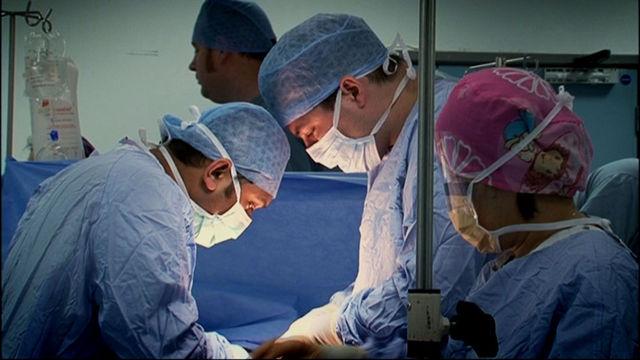Sixty-five-year-old Penny was exceptional. Unfortunately, just how exceptional was revealed after her death from a brain haemorrhage. In life, she was in the minority of people - 29 per cent - who have placed themselves on the Organ Donor Register. Transplant was a sobering, measured examination of what happened to her organs after death. All participants had waived their right to anonymity.
Retrieval surgeons found that Penny's heart, liver and kidneys were fully functioning and in perfect condition. Evidence for heart disease is usually expected. Sixty-five is the age limit above which hearts cannot be accepted for donations. Penny’s heart was exceptional, that of someone many years younger. It was transplanted into a 16-year-old girl.
In Britain, 1500 people die every day. Three could have been saved by an organ transplant
Footage of Penny from two years before her sudden death showed an active woman, energetically embracing life. Her husband said she believed our organs are lent to us. This rare, exceptional family had discussed what would happen to theirs after death.
In Britain, 1500 people die every day. Three could have been saved by an organ transplant. The fact that the organs of those on the Donor Register reach those in need is remarkable. Penny’s story involved 150 people, including the three recipients of her heart, liver and kidneys – a process run by NHS Blood and Transplant, the organ donor organisation. This story was about more than the wonder of life. It was about the calm, skilled professionalism of the people brought together to prolong the lives of others and how they are seamlessly integrated. It was so seamless that a specially chartered helicopter was ready to take Penny’s heart from London to Birmingham within hours of her death (a heart has to be transplanted within four hours of leaving the donor’s body). This National Health Service doesn’t deserve eye-catching, headline-grabbing ideas of increasing efficiency through introducing competition. Nobody here was competing with anyone. Yet still, lives were prolonged and enhanced.
It was also a National Health Service that served people’s needs, regardless of who they are, their circumstances or locations. Penny was a white woman. Her organs went to a white teenage girl in Birmingham, a black man and a white man, both in London.
This is day-to-day business for our National Health Service. No one expected thanks
The scenes of Penny’s body being dealt with by the retrieval surgeons were deeply distressing, almost impossible to watch. Although declared brain-stem dead, her heart had been kept artificially beating. The eloquence of the medical staff – and their respectfulness – was disarming. Penny's husband and daughter were even more affecting. But the stories of the organ recipients and their medical histories were also hard to cope with. Yet this is day-to-day business for our National Health Service. No one expected thanks. You suspect Penny wouldn’t have expected one either.
This documentary was not about what is or isn’t life, or which parts of a person bring them that life. Penny’s daughter said it wasn’t a heart or a liver that made her mother the person she was. It also wasn’t about what’s needed within you to deal with parts of you becoming parts of another person. But Transplant did end with a quiet plea for more people to sign up as donors. “A foreign body within your body - it’s not right," mused Michael, the recipient of one of Penny’s kidneys. "But I’m very grateful."















Add comment